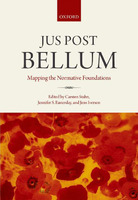Jus Post Bellum: Mapping the Normative Foundations
| dc.contributor.editor | Stahn, Carsten | |
| dc.contributor.editor | Iverson, Jens | |
| dc.contributor.editor | S. Easterday, Jennifer | |
| dc.date.accessioned | 2018-10-03 09:09:28 | |
| dc.date.accessioned | 2020-04-01T13:52:45Z | |
| dc.date.accessioned | 2017-01-26 23:55 | |
| dc.date.accessioned | 2018-10-03 09:09:28 | |
| dc.date.accessioned | 2020-04-01T13:52:45Z | |
| dc.date.accessioned | 2017-12-31 23:55:55 | |
| dc.date.accessioned | 2018-10-03 09:09:28 | |
| dc.date.accessioned | 2020-04-01T13:52:45Z | |
| dc.date.available | 2020-04-01T13:52:45Z | |
| dc.date.issued | 2014 | |
| dc.identifier | 622852 | |
| dc.identifier | OCN: 871172289 | en_US |
| dc.identifier.uri | http://library.oapen.org/handle/20.500.12657/31901 | |
| dc.description.abstract | The successful transition from armed conflict to peace is one of the greatest challenges of contemporary warfare. The laws and principles governing transitions from conflict to peace (jus post bellum) have only recently gained attention in legal scholarship. This volume investigates questions concerning the core of jus post bellum: the law (“jus”), the temporal aspect (“post”), and different types of armed conflict (“bellum”). It is the first volume to clarify the different legal meanings and components of the concept, including its implications in contemporary politics and practice. It explores the nature of jus post bellum as a concept, including its foundations, criticisms, and relationship to related concepts (e.g. Transitional Justice, Responsibility to Protect). It rethinks the nexus of the concept to jus ad bellum and jus in bello and its relevance in internal armed conflicts and peacebuilding. It examines problems in relation to the ending of conflict, including indicators for the end of conflict, exit strategies, and institutional responses. It also identifies contours of a “jus,” drawing on disparate bodies and sources of international law such as peace agreements, treaty law, self-determination, norms governing peace operations, and the status of foreign armed forces, environmental law, human rights, and amnesty law. Taking into account perspectives from multiple disciplines, the book will be relevant to scholars, practitioners, and students across many fields, such as peace and conflict studies, international relations, philosophy, political science, and international law. | |
| dc.language | English | |
| dc.subject.classification | thema EDItEUR::J Society and Social Sciences::JP Politics and government::JPW Political activism / Political engagement::JPWS Armed conflict | en_US |
| dc.subject.classification | thema EDItEUR::L Law::LB International law::LBB Public international law::LBBR Public international law: human rights | en_US |
| dc.subject.classification | thema EDItEUR::L Law::LB International law::LBB Public international law::LBBS Public international law: humanitarian law | en_US |
| dc.subject.classification | thema EDItEUR::L Law::LB International law::LBB Public international law::LBBU Public international law: international organizations and institutions | en_US |
| dc.subject.classification | thema EDItEUR::L Law::LB International law::LBB Public international law::LBBZ Public international law: criminal law | en_US |
| dc.subject.other | peace agreements | |
| dc.subject.other | peacebuilding | |
| dc.subject.other | jus ad bellum | |
| dc.subject.other | responsibility to protect | |
| dc.subject.other | transitional justice | |
| dc.subject.other | environmental law | |
| dc.subject.other | jus post bellum | |
| dc.subject.other | amnesty law | |
| dc.subject.other | human rights law | |
| dc.subject.other | jus in bello | |
| dc.subject.other | peace agreements | |
| dc.subject.other | peacebuilding | |
| dc.subject.other | jus ad bellum | |
| dc.subject.other | responsibility to protect | |
| dc.subject.other | transitional justice | |
| dc.subject.other | environmental law | |
| dc.subject.other | jus post bellum | |
| dc.subject.other | amnesty law | |
| dc.subject.other | human rights law | |
| dc.subject.other | jus in bello | |
| dc.subject.other | Conflict resolution | |
| dc.subject.other | International law | |
| dc.subject.other | Law of war | |
| dc.subject.other | United Nations | |
| dc.subject.other | War | |
| dc.title | Jus Post Bellum: Mapping the Normative Foundations | |
| dc.type | book | |
| oapen.identifier.doi | 10.1093/acprof:oso/9780199685899.001.0001 | |
| oapen.relation.isPublishedBy | b9501915-cdee-4f2a-8030-9c0b187854b2 | |
| oapen.relation.isFundedBy | 6af6bb7d-fc84-45a7-a8ce-58498ade1167 | |
| oapen.relation.isFundedBy | da087c60-8432-4f58-b2dd-747fc1a60025 | |
| oapen.collection | Dutch Research Council (NWO) | |
| oapen.pages | 600 | |
| oapen.place.publication | Oxford, UK | |
| oapen.grant.program | Vidi | |
| oapen.grant.project | Jus Post Bellum | |
| oapen.remark.public | Relevant Wikipedia pages: Conflict resolution - https://en.wikipedia.org/wiki/Conflict_resolution; Human rights - https://en.wikipedia.org/wiki/Human_rights; International law - https://en.wikipedia.org/wiki/International_law; Jus post bellum - https://en.wikipedia.org/wiki/Jus_post_bellum; Law of war - https://en.wikipedia.org/wiki/Law_of_war; Peacebuilding - https://en.wikipedia.org/wiki/Peacebuilding; United Nations - https://en.wikipedia.org/wiki/United_Nations; War - https://en.wikipedia.org/wiki/War |

